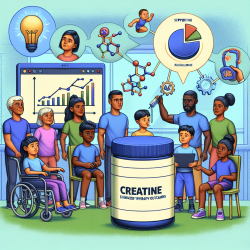The Untapped Potential of Creatine in Speech and Language Therapy
In the world of speech and language therapy, practitioners are always on the lookout for evidence-based strategies that can enhance therapeutic outcomes. A recent systematic review titled Creatine in Health and Disease provides compelling insights into how creatine supplementation could be a game-changer, not just for athletes, but for various health conditions, including those affecting cognitive and physical functions.
Understanding Creatine's Role
Creatine is a naturally occurring compound that plays a crucial role in cellular metabolism. Traditionally, it's been recognized for its benefits in enhancing athletic performance by increasing muscle mass and anaerobic capacity. However, the review highlights its broader potential therapeutic applications, particularly in conditions of metabolic stress where oxygen availability is compromised.
Creatine's Therapeutic Benefits
The review underscores several health benefits of creatine supplementation:
- Enhanced Cognitive Function: Creatine has been shown to improve cognitive processing and may be beneficial for individuals with cognitive impairments.
- Rehabilitation and Recovery: Creatine can aid in muscle recovery and rehabilitation, making it a valuable supplement for patients undergoing physical therapy.
- Neuroprotection: It offers neuroprotective benefits, potentially reducing the severity of traumatic brain injuries and supporting recovery.
- Glucose Management: Creatine supplementation may enhance glucose uptake, which is beneficial for managing conditions like diabetes.
Implications for Speech and Language Therapy
For practitioners in speech and language therapy, these findings open new avenues for improving therapeutic outcomes. By integrating creatine supplementation into therapy protocols, practitioners may enhance cognitive function and support neurorehabilitation in children with speech and language disorders.
Encouraging Further Research
While the current evidence is promising, more research is needed to fully understand the potential of creatine in therapeutic settings. Practitioners are encouraged to explore this area further, considering individual patient needs and existing health conditions.
To read the original research paper, please follow this link: Creatine in Health and Disease.










